Review: “Journey to the West” (By Funn)
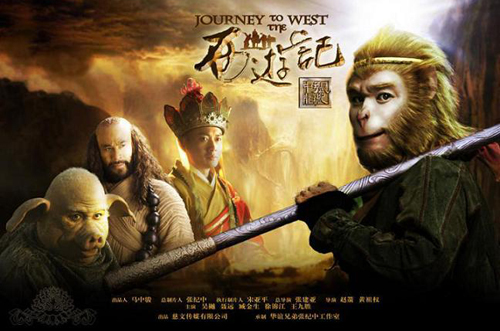
Journey to the West <西游记>
2011 Mainland Chinese Drama
Number of Episodes: 66
“Watch it for the performances and you will know why what people say is true; China is brimming with talented actors, and considering they’re all so limited thanks to the rubber masks, the environment, etc, this is what makes their performances even better.”
This is the …
Zhang Jizhong version which is said to closely follow the contents of the book of the same title by Wu Cheng’en (if not mistaken written in Ming Dynasty).
Title Deciphered
西遊記 which is the title of the book, English translation is Journey To The West but I believe the more accurate translation is The Diary Of The Journey To The West. The west here refers to India, because that was where Buddha was from.
Cast
From the cast list you can see how many people are in this series. Frankly I can’t recognise 99% of them, and I bet you won’t too either since they all look the same, same beard, same rubber face, etc.
The Monk, the 3 disciples and the horse
Wu Yue as Sun Wukong
Nie Yuan as Tang Sanzang
Zang Jinsheng as Zhu Bajie
Elvis Tsui as Sha Wujing
Qian Yongchen as White Dragon Horse
The Buddhas
Wang Huichun as Buddha
Liu Tao as Guanyin (holding a willow branch)
Liang Li as Guanyin (holding a fish basket)
Stephanie Hsiao as Thousand Armed Guanyin
TAE as Avalokiteśvara (Guanyin’s male form)
Yang Xiaolin as Guanyin’s female form
The Main Gods & Deities
Ma Jingwu as Subhuti
Zhang Jizhong as Taishang Laojun
Wei Zi as Jade Emperor
Feng Shaofeng as Erlang Shen
Ma Li as Queen Mother of the West
Yang Niansheng as Wei Zheng / Taibai Jinxing
Zhao Yi as Li Jing
Yang Guang as Chang’e
Ma Ruihao, Ma Ruihan as Nezha
Others
Tong Chun-chung as Emperor Taizong of Tang
He Zhuoyan as Golden Nosed Albino Rat Spirit
Chen Zhihui as Bull Demon King
Hu Ke as Princess Iron Fan
Yan Danchen as Baihuaxiu, servant girl
You Yong as King of Baoxiang
Shu Chang as Ruler of Women’s Kingdom
He Jiayi as Royal Advisor of Women’s Kingdom
Ady An as White Bone Demon
Zhang Meng as Lady of Wansheng Palace
Jessey Meng as Black Spider Demon
Zhao Lixin as Immortal Zhenyuan
Lu Xiaotian as Qingfeng
Liu Zenghui as Mingyue
Su Gang, Zhu Pengcheng, Li Zhonghua as Fu Lu Shou
Hong Zilin as Mao Nü
Ya Ning as Red Boy
Qin Ziyue as Jade Faced Vixen
Cheng Haofeng as Yellow Robe Demon
Wu Wenjun as Yellow Robe Demon’s son
Sun Yufan as Yellow Robe Demon’s daughter
Zhao Wenqi as Scorpion Demon
Zhang Hengping as Evil priest, Guzhi Gong, Dragon King of the South Sea, Long Armed Ape Monkey
Hu’erxide as Queen of Wuji
Zhang Chunzhong as Abbot of Baolin Monastery, Yellow Wind Demon
Hou Yueqiu as Immortal of Antelope Power
Li Tai as Nine Headed Bug
Su An as Almond Immortal
Li Qiang as Naked Demon
Zhao Qiang as King of the Southern Hill, Fire Tiger of Tail, Gao Cai, Meticulous Devil
Xi Xianfeng as King of Heat Protection
Pan Yanfei as Blue Spider Demon
Huang Yiwen as Purple Spider Demon
Lin Ketong as Yellow Spider Demon
Wang Yirong as Orange Spider Demon
Zhang Lisha as Red Spider Demon
Chen Jinjin as Blue Dress Fairy
Liu Jing as Purple Dress Fairy
Wang Xinzi as Queen of Biqiu (White Faced Vixen)
Gu Xuan as Fake Princess of India (Jade Rabbit)
Jing Gangshan as Manjusri
Ma Lun as Barefoot Immortal
Li Yuan as Virūḍhaka, Golden Dragon of Neck
Sheng Yang as Dhṛtarāṣṭra
Fu Yunzhao as Vaiśravaṇa
Jia Zongchao as Virūpākṣa
Shi Lei as Golden Furnace Boy
Sun Xinyu as Silver Furnace Boy
Ma Zijun as Reverend Wuchao, Wansheng Dragon King
Wang Jianguo as Dragon King of the East Sea, Sai Tai Sui, old monk
Zhou Xiaobin as Dragon King of the West Sea, Hundred Eyed Demon Lord (Centipede Demon)
Jia Shitou as Grand Saint of Nine Spirits (Nine Headed Lion), Juling Shen
Li Dan as Duke of Thunder
Zhang Chunyan as Mother of Lightning
Wang Lele as Granny of Wind
Yuan Li as Cloud Pushing Boy
Mu Jianrong as Wood Dragon of Horn
Lian Yuxuan as Fire Tiger of Tail
Su Mao as Lingji Bodhisattva
Xiaomao as King of Spiritual Touch
Qi Daji as Spotted Fish
Pengcuo Zhaxi as Abbot of Zhenhai Monastery
Wu Wenyu as Boy from Biqiu
Chen Shaping as Squire Gao, Mountain Deity
Mo Xiaofeng as Gao Cuilan
Yin Pingzhi, Zhang Xueying, Wu Yajing as Gao family maids
Ma Yuxi as Tang imperial consort
Li Shuang, Zhang Shen as Earth Deities
Qu Dalei as one of the Six Saints of Mount Mei
Liu Bing as Witty Bug
Gao Zhao as White Guard of Impermanence
Hu Shaolong as Black Guard of Impermanence
Bian Qiuwei, Han Biao, Song Lifeng, Zhu Qingmin as strongmen in Peach Garden
Yu Zhenhuan as Red Bottomed Horse Monkey
Chen Manzi as Water Star
Zhao Guixiang as Zhang Daoling
Bai Hailong as Wood Star
Ji Xiaolong as Gentleman of Mist
Wang Xiaoming as Hui’an
Song Songlin as Samantabhadra
Xu Hongzhou as Ksitigarbha
Gao Yuanfeng as Ananda
Wang Ruihong as Lishan Laomu
Huang Xingbei as Six Eared Macaque
Bahatiya’er Aizezi as King of Jisai
Zhou Gang as Maitreya
Alipu Aitanmu as King of Zhuzi
Liu Zhengliang as Immortal Ziyang
Wu Yanshu as Pilanpo Bodhisattva
Shi Hengliang as Sun Rooster of Hairy Head
Yibulayimu Paha’erding as King of Biqiu
Shadike Shata’er as Royal father-in-law of Biqiu (White Deer Spirit)
Yasheng Maimaiti as King of Miefa
Gulibaha’er Abudureheman as Queen of Miefa
Ayiguzhali Abuduwayiti as Royal consort of Miefa
Gulijiamali Maimaitiniyazi as Widow Zhao
Nijiati Niyazi as King of India
Reyihanguli Keranmu as Queen of India
Kalibinu’er Keyimu as Princess of India
Summary
Need I summarise the legendary god awesome amazing *you say* fictional *others say* real story of the Monk Xuanzhang and his disciples, a golden monkey, a pig and a fierce man with his white dragon horse’s (in this series) 20 year epic journey to India to see the Buddha and to retrieve the Buddhist scriptures so be taken back to China to spread the word around during Tang Dynasty? Phew! Long eh? No need? Need? Ok, here is the summary taken from Wikipedia, about the book itself which is basically what the series is about;
“Journey to the West is one of the Four Great Classical Novels of Chinese literature. It was written by Wu Cheng’en in the 16th century during the Ming Dynasty. In English-speaking countries, the tale is also often known simply as Monkey. This was one title used for a popular, abridged translation by Arthur Waley. The Waley translation has also been published as Adventures of the Monkey God, Monkey: [A] Folk Novel of China, and The Adventures of Monkey, and in a further abridged version for children, Dear Monkey.
“The novel is a fictionalised account of the legendary pilgrimage to India of the Buddhist monk Xuanzang, and loosely based its source from the historic text Great Tang Records on the Western Regions and traditional folk tales. The monk travelled to the “Western Regions” during the Tang Dynasty, to obtain sacred texts (sūtras). The bodhisattva Avalokiteśvara (Guanyin), on instruction from the Buddha, gives this task to the monk and his three protectors in the form of disciples — namely Sun Wukong, Zhu Bajie and Sha Wujing — together with a dragon prince who acts as Xuanzang’s steed, a white horse. These four characters have agreed to help Xuanzang as an atonement for past sins.
“Journey to the West has a strong background in Chinese folk religion, Chinese mythology and value systems; the pantheon of Taoist immortals and Buddhist bodhisattvas is still reflective of some Chinese religious beliefs today. Enduringly popular, the tale is at once an adventure story, a spring of spiritual insight, and an extended allegory in which the group of pilgrims journeying toward India represents individuals journeying towards enlightenment.”
THE ENDING FIRST
From Wikipedia:
“Chapter 100, the last of all, quickly describes the return journey to the Tang Empire, and the aftermath in which each traveller receives a reward in the form of posts in the bureaucracy of the heavens. Sun Wukong and Xuanzang achieve Buddhahood, Sha Wujing becomes an arhat, the dragon horse is made a nāga, and Zhu Bajie, whose good deeds have always been tempered by his greed, is promoted to an altar cleanser (i.e. eater of excess offerings at altars).”
Seriously, the series actually does follow the book(s)! For more on the book(s), go to http://en.wikipedia.org/wiki/Journey_to_the_West
OPINION SUMMARISED
Previously blogged about this series here at http://point2e-reviews.blogspot.com/2012/07/journey-to-west-tvchinao.html.
COMMENTS
My no. 1 most favourite series of all time, which happens to be a TVB series, is Journey To The West, the Dicky Cheung version. It is because of this series, that all my hate for TVB these days is milder than it should have been because I know TVB is capable of greater better amazing stuff. I could write a thesis why I love the TVB version but that would be like a major fan crush sort of thesis which I am sure you will be bored to tears to read. However this Zhang Jizhong version has given me the opportunity to reexamine my love for this story, TVB version and in the end this version itself.
First of, let me write a bit of my background/credentials when it comes to JTTW.
I have read until Book II of the English translated version until I got so disgusted with how the monk was behaving, I stopped reading altogether. It made me love TVB version more. I have seen the original China production featuring the definitive Sun Wukong, which is Liu Xiao Ling Tong, but I didn’t love the series as a whole though I really liked the 1st monk until strangely halfway another actor became the monk and I didn’t like him. My most favourite interpretation of JTTW is TVB version starring Dicky Cheung. I disliked JTTW II by TVB, starring Benny Chan, but loved certain aspects of it. Have seen some of the China version acted by Dicky Cheung and absolutely hated it. Saw one full version of a China adaptation I believe in 2010 or 2011 but never liked that because it was too buddy-buddy type. Heard of and saw a bit of the movie version as in some alien thing going on in the Nic Tse version which I hated. Never quite liked Stephen Chow’s version BUT Stephen Chow himself would have been an awesome Monkey King, but more of the scary angry temperamental kind. Heard of the Japanese comedy classic, Saiyuki but never seen. Heard of the OST done by Damon Albarn for the I believe theatre version of JTTW with some nifty concept. Trembled with fear when Hollywood announced an adaptation but until todate, no news so thank you very much! If there are other versions, I am not aware of them. All in all, I can pretty much say that I am a huge JTTW fan, from the concept to the stories (maybe not so much love for the books themselves) and I take notice of any adaptation whenever one is released, and most often I groan more than I shout yeah.
Until this 2011 version came along.
Seriously before I watched this series I was thinking “not another adaptation!” but I knew Zhang Jizhong’s reputation for cinematography, he makes beautiful series but whether he tells a good story is another matter. When I first saw the posters, I was intrigued. The Monkey King looked a tad like Stephen Chow’s version as in very demon like. Which is different. Most Monkey King is temperamental, playful, impatient but one that looks like he can kill you because he can, with that evil demonic stare? This is almost a first. The pig looked like a pig. Wujing looks.. scarily fierce. The monk himself looked young, sorta handsome but to me at first glance I wasn’t convinced. Then the broadcast over TV and I decided to watch it, not knowing it will be 66 episodes until more than halfway and I read it would have been longer if the editing wasn’t butchered by the censorship or something like that. And what a pity, because perhaps this would have been the definitive retelling and adaptation of the books. Now don’t be mistaken when I say definitive retelling and adaptation which is not to say the best but rather the most complete. How true is its adaptation I can’t confirm since I never finished the books. But from the description in Wikipedia, and from what I can see how the story just moves on so swiftly, I will say the adaptation is in accordance to the books especially in the way the endings are dealt with in such a perfunctory manner, it was almost like reading the books.
The books were written in Ming Dynasty, some says it is actually a story about rebellion against the imperial government, you can say it is a fantasist sort of story and to many, the story is beyond fictional; it is legendary since it is based on a true journey of such a monk, except you won’t find the other disciples or demons, etc. And I do believe by that time Buddha has long reached nirvana. It is a sensitive story because Sun Wukong, at the end of the book is directly translated as Combat Buddha is actually revered by actual people. Even the Monk is revered. He has a temple back in Xian. So the story becomes more than just fictional story or legends, they become myths that may have been real. Some believe them as real. For me, real or not, Journey To The West is a brilliant story of redemption and finding one’s purpose. It is so multi faceted as a story, each adaptation can bring to it a fresh perspective, whether I actually like the perspective or not is not important. It is a flexible sort of story.
The books are more like tell a story and move on. Whatever is between the lines, you read into them. Some adaptation chose to tell it as it is, some focuses on the comedy aspect, some on the brotherhood, some on the love aspect and TVB version, being the best, merged all these and added in the religious aspect plus some educational aspect, making it the most rounded adaptation. Believe it or not, on paper JTTW is a very religious story, since it has gods and deities, Buddhas and demons and the story is how the religious point of view merges and blends with the idea of redemption, sins, etc. But Mainland China adaptations almost always never pursue that path alone since officially China doesn’t have an official religion. Buddhism itself is atheist, but the story merges between Buddhism and Taos and what nots, making it a world of its own, rules of its own. And Chinese adaptations are almost always about the rules, not really from the religious point of view, even if you see Guanyin or Buddha. Somehow they just never strike you as religious, just a matter of fact.
This present adaptation is one part about rules, but does include the religious aspects as it should. But I will say this much at this point; it is not the best storytelling but I enjoyed it nonetheless for various reasons unconnected to the storytelling.
How do you tell a good story in a good way? I mean JTTW itself is a goldmine of a story. A movie version will not give justice to it. To alter it to focus just on love is fine if the disciples looked into that issue as observers and not participants. When they become participants that is when I switch off the TV because JTTW is about Buddhism in the end, which is how I prefer to look at it. So it has to be a TV series and it has to be a long TV series.
Please bear with me on what I have to say about JTTW TVB version (and I do mean the Dicky Cheung version).
It is funny, it is intelligent and in the end it is deeply religious and profoundly educational. I never thought I could get all that from a TV series, more so a TVB TV series but I did. Take away the comedy and “Yo! Beat the demons? Never fear!!” tagline or the flexible Dicky or tearful whiny Evergreen or the strict unsmiling but compassionate Kong Wah or the tricky slimy selfish Wayne Lai, it is in the end a series devoted to its subject matter; the path towards enlightenment. It tells half the journey beautifully, even if some stories are a bit long winded and I am sure many are altered, but the alterations were justified because they served the purpose. Each story is connected to the other, with the 4 protagonists not just observers but participants but never altered to the point that changes their personalities and purpose. The stories are somewhat modernised and given a new perspective. When it ended, I felt terrible because I missed it so much. So I watch it on reruns, nowadays I pick and choose which story to watch, my favourite being “Three Strikes On The White Bone Demon” because that was the most emotional, even for the demon. Again TVB altered the story I believe or rather gave it a new perspective that it was very sad. But the most heart wrenching was the ending scene for “The Red Baby” story, where the story brings home the consequence of one’s action and the punishment, though harsh is a necessity. The last story about the protagonists giving birth to their own child and the choices they made was the one that made me see Buddhism in a new light. I always felt Buddha was selfish to walk out of his heavily pregnant wife, his people, his aging father. But that one simple scene of the monk explaining to Wukong why Buddha did what he did, that was like thunder striking me. Like a sudden understanding and I understood. It would explain why Gandhi did what he did, Martin Luther King, etc. And it took a TV series to tell me that. And in between all these profound moment, the TVB version merged the story with laughter, tears, comedy, brotherhood, plus some of the most amazing performances ever with the best casting decisions ever. Yes, Kong Wah was too old and dark to be the monk but he was perfect in his mannerism, so much so I was very disappointed when I read the book(s) the monk was such a coward in the earlier pages. Kong Wah’s monk never wavered, even if he made mistakes, even if he was naive but he was so believable as a mere mortal who could be the teacher of 3 demons, so much so his 2 decades or so as a human being has more wisdom than the thousands of years combined for the 3 of them. Wayne Lai’s Wuneng (pig) whilst having the best lines and the funniest scenes actually showcase the most traits of a human being, our flaws, our weaknesses. Evergreen Mak’s Wujing may be whiny and cries too much but he has qualities none of them have; utmost dedication and a desire to change to be better. If you watched this JTTW 2011 version, you will better appreciate Evergreen’s interpretation. And then there’s Dicky’s Wukong, not the best Monkey King but certainly the most modern sort of interpretation. I love his update on Wukong. That is why I love JTTW TVB version; because it has every element I ever looked for in a classic TV series. And did I mention the makeup? It was innovative. Just enough to look like the characters with room for the actors to act with their expressions. It has some of the most imaginative makeup ever, and the costumes were good. My only complaint is the limited scenery and the horse which I shall explain more later. JTTW II, the sequel had more scenery and a very good almost ending scene which explains why they had to undertake this journey, which to me was profound but a pity the entire series was draggy with some terrible casting decisions.
And now I come back to JTTW 2011, the purpose of this review. Why I take my time explaining why I love TVB version is to show you where JTTW 2011 failed, and where it succeeded.
For one, the part about the white horse is where JTTW 2011 succeeded. I love the fact that no one ever forgets about the horse. If they fly one place, the horse and the luggage flies with them. The horse gets some great scenes, with the actor taking over as the dragon horse being very very handsome in his all white outfit. And also the horse itself, or maybe several horses were used, was probably one of the best animal actor ever. Despite all the sounds and actions, it stood there, calm and ready. It does look like a beautiful white horse, towards the end a bit dirty but a nice looking one. I also love the ending for the horse; it has an ending. In short, I like the part of the horse as he is not just there, not just an observer but a participant and in some scenes, a very active participant.
The scenery for some scenes are beautiful; the caves, the streams, the trees, the sands. However this is very limited, no thanks to introduction of CGIs and green screen or whatever they’re called, filmmakers became too dependant on such technology and this is a major problem for this series as I shall explain later.
Some costumes are beautiful, and authentic and they’re mostly male. The female ones are mostly frilly, a bit too much cloth and I almost never liked their hair or their makeup, except for the Rat Fairy/Demon who looks rather scary in her rat form.
Some special effects are just beautiful when done just right. I still remember the scene where Wukong split into several dozens Wukong as he explored a wide network of caves in the Rat Fairy/Demon story. Then there’s the stop time technology and you will see Wuneng picking the suspended buns to eat. There are several more of such beautiful special effects but I can remember vividly these 2.
Of all the stories told, the longest would be the rat fairy/demon story which started off well, but the ending was terrible. The one that I remembered the most is the shortest one, the one about the king who offended the Jade Emperor and his land and his people were made to suffer and if Wuneng complains about the drinking water, it can only mean the drinking water must be absolutely terrible. That was the story how Wukong scolded the Jade Emperor and the unfairness of punishment, etc and to me the most emotional because there are many kings, queens and emperors in the journey, but this particular king was a good king who loved his people. His only mistake was insulting the Jade Emperor, and he didn’t even know he did that. I admit I didn’t watch all the stories religiously but that is the one I remember the most, apart from the ending.
Then there’s the controversial aspect; like I said this is a story than can be religious. I applaud the writer though for injecting a bit of sex into the story. I don’t mean the act, but the idea of it. The monk gets kidnapped a lot, forced into marriage a whole lot more but only towards the last of such story, the rat demon story where we see something more practical. Surely these women wanted him because of some past connection and also because he is a good looking guy. That scene where he was disrobed (oh yes the monk gets disrobed quite a bit often but not this way) and how the demon slowly trace her fingernails along the back of his spine, it was sensual until I remember “Hey! We are talking about the monk here!” so let’s banish that thought. The last scene where the monk was made a Buddha and he wore something rather Indian and rather revealing and the same thought crept up. Yes, Buddha can be sexy too eh?
There is also some politics in here and I love how the Gods and deities could not arrest Wukong since he is now so called under Buddha’s jurisdiction and Buddha is mighty!
And the many cast and many characters, since China is such a big country with so many people, I do believe some are authentic sort of people for that sort of place. You see more foreign looking Chinese people than Han Chinese people. And I like how the more they’re near India, the more the actors dress like in India and even Wukong mentioned the word “Curry”.
Performances by some of the actors are the main reason why I love this series and I shall explain more later.
However, like TVB version is classic but not perfect, this series is far far away from perfect.
For one the storytelling is rather.. impersonal. What I mean is you feel for the characters, sometimes but not all the time. It begins well, but the ending is always abrupt or maybe I should say when they move on, they move on. Everything else that happened didn’t seem to matter. There is no connection between point A and point B and certainly no emotional tie between story 1 and story 2. It was very compartmentalised, and you can pick and choose your story if you want. However the good thing is the 4 main characters grow as each story goes along but the series seems to forget the demons are every part of this story as the 4 main characters. I feel I can’t sympathise with many of the demons; their stories are almost never fully told or they’re abruptly told and I find mostly, female demons want to marry the monk, male demons want to eat the monk. And frankly after a while I got tired of that. How many times do I have to watch the monk being kidnapped, then forced into marriage or almost cooked? So many times in this series but if you feel the same way, do remember, this is a very long series and since it follows the book(s), then clearly the monk would have been kidnapped several times. I just don’t like how compartmentalised and impersonal the storytelling becomes towards the end. Like the rat demon story. It started ok, went on very well, I even pitied the rat demon and suddenly in 5 seconds she realised she already had 1 day with the monk and that should be enough and she lets go and he moves on and the end. If there is a problem with this series, it is that it doesn’t know a good cliffhanger or a good climax or even a good moment to emphasise on and to hold our emotions to it. It is just “here, did, leave, the end”. And it doesn’t even connect to whether religious or any educational point of view. Some are entertaining, some are excruciating to watch but none has the impact, that punch. And this is where TVB version succeeded like no other. There is a reason why the TVB version is so successful and the storytelling and retelling of some stories is the main reason even if the viewers may not realise it back then.
The makeup is both a blessing and a curse. Blessing because they look like their characters but a curse because most actors had to wear rubber masks and if you notice, their mouths never really moved. Since their voices are dubbed, it doesn’t matter. But it is annoying the amount of rubber. The only one with rubber face on and still can move his mouth a little is Sun Wukong who actually looks nice but again sometimes frozen. The rest just seems frozen where facial expressions is. The lady demons’ makeup makes them indistinguishable. Some do look like rat, rabbit, etc but I find their makeup unimaginative; just realistic but nothing which can make me go oh this is she and this is her. They all look the same; even the voices sound the same.
The worst, the green screen. Like I said, if used well is great but if used too often, the filmmakers become lazy. My sister was reading the list of on location shooting and she was like did they go to all those places? Because I do agree, most of the travelling scenes, they walk with the background superimposed. In fact there are more superimposed scenes than real scenes. The real ones are usually where there are a lot of demons and there is some fighting going on. Other than that, most of the time they’re parked in front of the screen. If you’re those who is annoyed with 4th prince being parked in front of those green screen for those lotus pond scene and the grassland scene in BBJX, I am sorry to say, in this series it is used like 100 times more. To the point that I just feel so annoyed. I understand the difficulty about on location shooting but even walking left to right, is in front of that darn screen. Except for caves. Maybe even the caves are fake.
Then there’s the overly blurry celestial sky for the gods and deities and even Buddhas scenes. Yes, they’re very pretty, very fantasy like, some effects like the cloud horses running along the errr.. clouds and what nots are beautiful. That Buddha is so big and so is the Jade Emperor which is great; reminds me of Percy Jackson movie where the Greek gods are huge. But so blurry to the point I can’t see the faces clearly. Frankly I don’t like the heavens scene. I felt like I was on drugs, hallucinating with the overly blurry scenery. And yes, all done on green platforms and green screens.
There is also a problem with the fighting scenes. First quarter was boring, because it was as if Wukong did very little fighting. I suppose the stunt double was not available then because after that, the fighting scenes becomes increasingly better, more imaginative and looking rather exciting for us but tiring for the poor guys on wires.
And finally the editing but I read the director was forced to cut down on the episodes so I can’t fault him for some disjointed feel but surely he would have ended the stories better? Like the ending scene, where each was promoted. And then cut to the monk alone back in Tang, spreading Buddha’s teaching. And I emphasise ALONE since I assume his disciples now left him to move on to.. what? The severence of that emotional tie between the disciples and their teacher is non existent. Maybe some words of comfort; some words of good bye. After all it is a final thing; each goes on their own road, and since they spent 2 decades with each other, at least a reluctant good bye would be quite nice. The scene I do like was when the monk thought Buddha refused to give him the scriptures as the Tang was not worthy and he collapsed onto Wukong on the rocks and cried. Never quite seen him cried but he cried this time and I thought that was the emotional connection I was looking for. Next thing, back to heaven and the connection is severed once again. Even the horse changed into a dragon and flew off; not a good bye. Even when parting with their weapons, not a tear, not a sad goodbye. To me Wukong’s errr golden stick (?) is as essential to Wukong as Wukong is to the monk. I love the story how he found his weapon and how he took his weapon which was one of the funniest scenes in this series. But I find the parting scenes, and most ending scenes in the stories almost heartless. Maybe it is the editing. But if 2 or 3 episodes more would tie things up pretty nice, then I wouldn’t mind. For me, this version is good for some reasons but definitely not for the storytelling. It just doesn’t know how to latch on to that emotional us. I felt cold.
What is good though, is absolutely great! Like I said, the biggest reason to watch this series, apart from being a JTTW buff is the performances and for that I can’t fault them.
One thing I must emphasise; the voices are dubbed and I doubt they’re dubbed with their own voices. But the voices used were suitable, and I do understand how to expect live recording with so many layers of rubber on their faces?
Which is why I applaud the performances for some major characters. The rubber surely limited the expressions so you don’t get the facial expressions. Like I said, they looked frozen. But the actors compensate that lack of expressions on the face by using their body language 100% more. They move more, they move in a certain way more, their eyes became the window to their performance. The soul of this series is the performances and the soul of the performances is in the eyes and body language. You won’t find a stiff actor in here, so to speak.
For instance, Wu Yue as Sun Wukong. There are actually 2 Sun Wukong, one is the stuntman and the other, the actor, Wu Yue which you will get to see in person. He looks bigger as a person than he was as Wukong but his twinkling eyes, his smile, his hand movements, you will know it is him instantly. He is the soul of this series as in any JTTW series. His performance seems to be inspired by the original great Liu Xiao Ling Tong and the way he introduced himself, jump up and down, and generally modernising his Wukong a bit I believe is inspired by Dicky Cheung. In fact I see more Dicky Cheung in him than Liu Xiao Ling Tong. No doubt, he is a fantastic actor if you’re talking about body language. I love the way how his Wukong would hold onto a person he doesn’t like, never letting go and how the monk beat his hand gently and he is still holding onto that person. It is his interpretation of how naughty and sometimes quite scary Wukong canbe that made me sit up and watch this series. However he isn’t as scary as in the poster though. I wish he is a bit more fierce but I feel he is very true to the book; the way he talked to the monk at first you can feel he is someone who is foced into this and thinks very little of the naive monk. I like how he progressed to the Wukong in the end and his relationship with his “brothers”, especially Wuneng. Wu Yue made this very popular character into his own and whether he or the stuntman for any scene, this Wukong never sit still. I feel almost tired for the actor himself, having to constantly move. I can feel his fatigue but his Wukong never faltered in the physical sense. That is why I admire Wu Yue. You can see he gave it his all into this role, when he was limited by so many factors, and yet he managed to make his performance matter. In the last episode in the BTS scenes, he cried at the end of the shooting. I can understand his feelings of being overwhelmed and frankly if there is a reason to watch this version, make it Wu Yue. I will be catching up on his future performances. And I am very happy the director did not cast his favourite muse who is busy with his acting career. I can’t imagine Huang Xiaoming in this character. Maybe I can, and it would give me very good reasons to not record this series at all.
Zang Jinsheng as Bajie the pig is a big tall actor from his size even without all the rubber. He is not young. Like Wu Yue, I was surprised by his real face. Whilst I do not like the pig nor its characterisation (in TVB version the pig is human like and is very cunning, in this version the pig is the stupid one with human traits), I appreciate the actor’s effort. Again, this is one character that is constantly moving, and since he is under even more rubber on his face, he is the actor that relied a lot on his body and his eyes. His command of his body language is almost perfection. Yes, he is annoying but you can’t deny, his performance was fantastic in terms of how he tells us something by how he moved. So tiring looking, such a physical role but he was fantastic. I feel almost glad for him to be rid of all the rubber when he is supposedly in his human form.
Elvis Tsui as Wujing requires very little rubber so to speak. He is in human form. He looks fierce, and yes he can act but the problem is Wujing is such a non entity until towards the last quarter of this series. Most of the time he just stands there, straight, with a rather operatic pose and rarely talks and just have one look; that of fierce confusion is how I see it. He is a serious character. Only towards the end he has more lines to utter, but still the same expression. It is interesting how the actors in rubber are so expressive and the one who isn’t in rubber is the least expressive. He is limited by his role but as an actor, he is good.
Whilst the Monkey God plays a very very important role in this series, the monk is perhaps the one who started it all so to speak. Nie Yuan for me at first isn’t good looking enough. I kept thinking he doesn’t have that wisdom that Kong Wah has. But I was spoilt by Kong Wah’s fantastic interpretation. Because Nie Yuan’s interpretation is similar to the book(s), except less annoying. He is scared, he is naive, he is innocent and he is annoying. But as the series progresses, he becomes more astute, he is still naive but not as innocent, he becomes rather impatient, has a bit of temper and is less annoying. One part is still missing; inherent wisdom. For me the monk must be believable as someone who is mortal and yet so inherently wise that he can be the teacher to 3 beings who are way older than him. Kong Wah succeeded in that, and Nie Yuan didn’t quite made it but he compensated it with his rather true interpretation of how a monk such as Sanzang will behave if he is faced with the same situation. In retrospect Kong Wah’s monk was too perfect in that sense; who was wise before he should be. If that is how you see it, then Nie Yuan did a fantastic job. If you don’t, you will feel Nie Yuan was missing something that only age can bring. The actor who dubs his voice did a great job in giving him a calm voice that never shouts. Whilst I am bored with the constant kidnapping and his disbelieving Wukong over everything like so many times, I can’t deny I enjoyed his performance. He is a good looking guy, and amongst so many old, bearded, rubber faced demons and human being, he is like the handsomest. And he gave a very sexy interpretation of the monk. Ok, I didn’t say that. Just watch and you will see what I mean.
The human form of the White Dragon Horse is rarely seen. When I do see the actor, my first reaction is so handsome. Maybe because he is always in all white. The actor is Qian Yongchen by the way.
The rest I don’t have much comment except for;
Feng Shaofeng as Erlang Sheng or in TVB, that 3 eyed dude had very little role. Kinda chubby cute though. His acting, no comment. I mean I don’t like him. He is just chok chok chok as Erlang Sheng and nothing else.
I love the fact that actual children are used for characters featuring young deities, such as Nezha which I see from the cast list is played by 2 children, probably twins; Ma Ruihao, Ma Ruihan. Excellent performance by both of them, Nezha is presented as someone reasonable and level headed, fair and compassionate and all these qualities coming from a kid should make the adult actors hang their head in shame.
The Red Baby, I assume Red Boy is him and from the list is played by Ya Ning. Another winning performance, such a commanding figure and it is a kid! A kid!
The Land Deity is played by midgets I believe. Quite a surprise. And so many foreign looking actors which I am sure are from ethnic minority groups and not really foreigners. No comment on their acting.
I don’t remember the actresses much except for the actress who plays the Queen who was kidnapped for 3 years by a demon, she wore the invincible thorny dress to prevent the demon from touching her. One look and I thought “How come Charmaine Sheh is in this series?!”. True, does look like Charmaine Sheh. Good performance.
I was very excited to see Wang Huichun as the Buddha. Being a massive fan of Yong Zheng Wang Chao, to see the 8th prince again is such a treat even if he looks a tad weird; like so thin! I believe that is his voice, unless the dubber is the same as in YZWC. Frankly I can’t tell anymore just from hearing voices. No comment on his performance though. I just find he has too much make up and rubber on. But I like him so I like his performance.
I was very disappointed with Liu Tao as Guanyin. I didn’t notice the other actors as Guanyin in various disguises and I couldn’t even recognise her as the same actress in Qing Shi Huang Fei until I googled her. She looked fairer in here. No doubt she is a beautiful woman but I don’t find her convincing as Guanyin. I feel she lacks that gentleness, that compassionate face, she is almost too fierce as Guanyin and also a bit amateurish. Like Guanyin in training. My favourite is still TVB version.
A bit of He Zhuoyan as the rat demon/deity since she is going to be in the upcoming highly anticipated series, Xing Ming Shi Ye starring my 2 favourite guys, Lian Cheng aka Wallace Huo and 4th Prince aka Nicky Wu. At first I wasn’t impressed, and I couldn’t judge since I can’t hear her voice but towards the end I thought she brought out the anguish, pain and stubbornness of the rat demon pretty well. I think she can act, except she doesn’t have a memorable face, which is made memorable thanks to the rat makeup. But amongst the many females, at least I can recognise her. The rest I can’t even tell who is who.
As for everybody else, I can’t remember. There are just too many people in this series. many just very special appearance. What matters is the main players were fantastic.
Verdict
If you’re not into that sort of pacing for Mainland China series, hate dubbing, this is not the series for you. I don’t want you to have a bad impression on both JTTW and Mainland China series which is better than what most thinks but not as great as what the fans may think. But if you love all things JTTW, I am sure you won’t be disappointed with this adaptation. Just be prepared to be disappointed in some aspects like I have highlighted above. However if you appreciate that sort of acting that you know is physically tiring but you can see everything body language wise, I highly recommend this series. Watch it for the performances and you will know why what people say is true; China is brimming with talented actors, and considering they’re all so limited thanks to the rubber masks, the environment, etc, this is what makes their performances even better.
For a more deeply personal recommendation, if you haven’t watched, please I urge you to watch Journey To The West TVB version. It may be old but it is still darn funny. Whichever point of view you may wish to use when watching JTTW, I am sure there is one that you will agree with. Let me rush back to my DVD copy now!
OTHER VERSIONS REVIEWED
Pilgrimage To The West (China ver)(2009)
Journey to the West 1 & II (TVB ver)
This review was written by Funn Lim, a Contributing Writer at JayneStars.com, and was originally posted at http://point2e-reviews.blogspot.com/2012/08/journey-to-west-2011tvchina.html

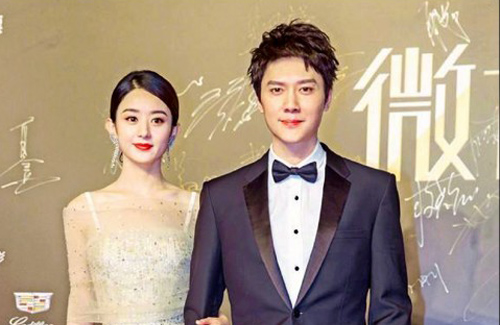
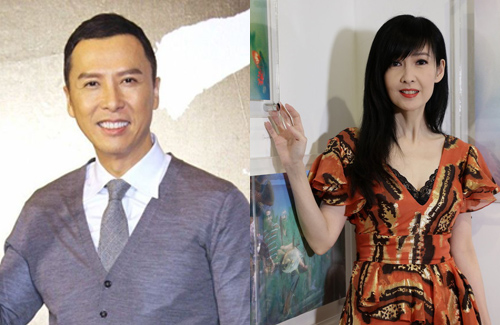
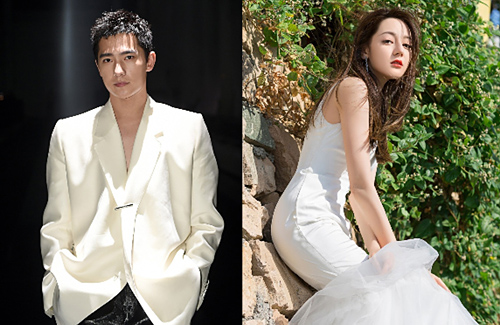
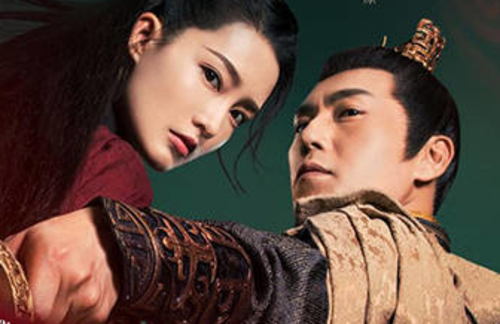
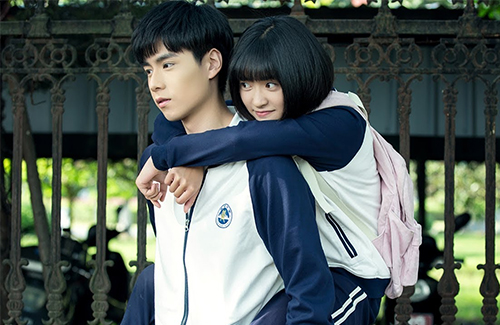
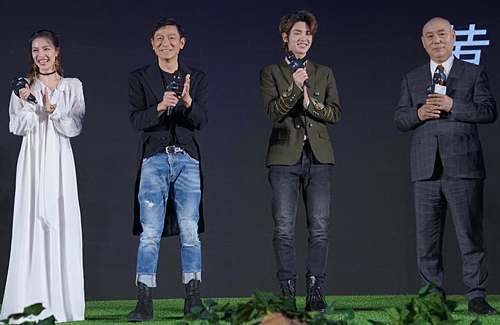
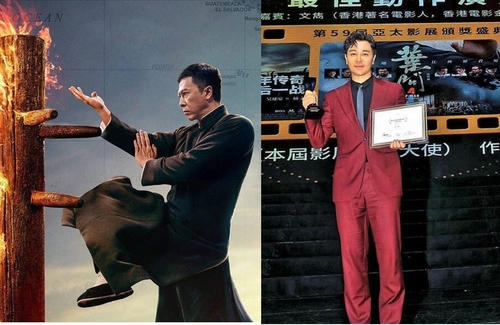
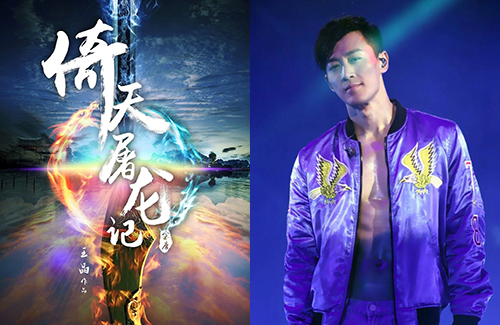
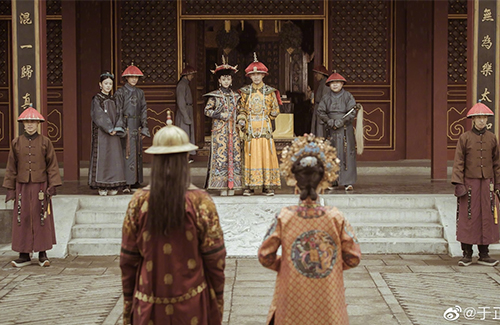
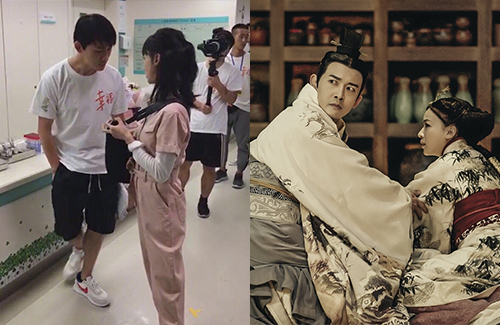
JTTW is def one of TVB’s classics. I always re-watch it, lol
haha me too, i don’t know how many time i have re-watched lolz
JTTW is one of my favorites! Love the one with Dicky, Wayne and Evergreen. Anyone that knows where I can watch JTTW 2011 online?
The 2011 version is okayyyyy….. I think this version focusly on special effects way too much. The acting is excellent. It’s not too engaging to the story. Very top notch China made quality.
The 1996/1998 TVB versions is still good, I re-watch the 1996 so its a catch up to memory.
I still think the old genuine 1986 CCTV version still is the best of all.
I agree and love the 1986 version the most. The cast and everything was great.I never saw the 96 version so can’t comment but love Cheung Wai kin as the an actor.
I love the monkey king in the 1986 version but I find the stories are not connected. TVB version has the distinction of making it viewers friendly and making the story connect to one another on many levels. Storytelling wise, TVB’s JTTW was the best. Monkey king wise, of course original is the best. Overall acting wise, this new version is lovely as it is by the book but my love for JTTW TVB version will forever and ever be undiminished for the fact that no one could tell a satisfactory story unlike the TVB version.
stll prfer the dicky cheung version….am freaked out by ths zhu bajie
I love the TVB JTTW most. Always re-watchable.
Just a small side note Funn: I know you have strong opinions hence the length of the reviews but maybe some headings would be helpful lol.
Thank you for the lovely review, Funn. Now I have more to add to my “to watch” list once I finish Gaksital and Arang!
The D**** Cheung ’96 series remains THE definitive version for me, but the remake with all the singers and idols was an absolute catastrophe. I find that to be the case for a lot of his works within the last decade or so anyway; all too derivative and the humour contrived/tasteless. I also loathed his update on the Duke of Mount Deer. Bleh. Shame, because I still adore him as an actor.
It’s unfortunate but no version measures up to 1986. I can re-watch 1986 over and over again and would never get bored. The other versions aren’t worth my time.
Frequently rewatch the 1986 in my early childhood memories. It was funny and good times. Im too old, now
I don’t think you can ever get too old to rewatch a series that you like. I often rewatch series from the old days for not only good entertainment, but to relive and bring back my childhood memories which is why they mean to so much to me. My mom still loves the 86 version and she is in her 70s so you are never too old…
My Fav @ all time is 1st and 2nd TVB version of Journey to the west
Lol, nice review, funn. I gave you credit for making me wanting to watch dicky’s version. I grew up watching the original jttw 1986, and I loved tvb jttw2 with Benny, as I found it funny and entertaining. Strangely enough, I didn’t see dicky version. Only know about it after watching a few of dicky drama, where I first found him funny, then annoying, contrived, and 1trick pony (same moves, same facial expression, same storyline to make u laugh). After 3 dramas, I hate him to the point of never to see another drama of him if I could help it. Or fast forward his part.
I don’t mind some of the mainland series, however, I found their pacing is too long, so long winded, unnecessary characters, and the supporting characters are often way too annoying to watch. And lots of time, the stupid plot line. And the acting, and the corny cg and action sequence. Like in xuanyan sword, a projected fake movie is -.- the carriage horse is small yet it’s like so big inside, contain a jail cell for an adult, n yes, I know it’s magically, but to make magical movie is gg >_>.
Anyway, my rant for don’t like lot of mainland series will kill you all, since I know lots of you loves these series. Thank for writing up the review, and maybe, I will try dicky version if it passes me by again
You must watch it since if you can stomach JTTW 2 with Benny Chan who basically sorta copied Dicky, you will love JTTW. But it is really because of Wayne and the chemistry and the story being retold in a friendly easy to understand manner. A deserving classic though first 2 episodes is really slow.